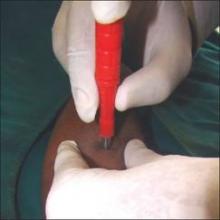Physicians may be profiting by referring pathology services on biopsies to in-house labs or to pathology labs where they have an ownership stake, according to a report from the Government Accountability Office released July 16.
The agency found that three specialties – dermatology, gastroenterology, and urology – accounted for 90% of the self-referrals in 2010. Dermatologists alone accounted for half of those self-referrals.
The practice is costing Medicare millions and resulting in excess treatments, according to the report. The agency estimated that overall in 2010, self-referring providers likely referred 918,000 more pathology services than did physicians referring to labs in which they did not have a stake. The extra tests cost Medicare about $69 million out of a total $1.28 billion tab paid to physicians, pathologists, and labs in that year.
Overall, from 2004 to 2010, "the number of self-referred anatomic pathology services more than doubled, growing from 1.06 million services to about 2.26 million services, while non–self-referred services grew about 38%, from about 5.64 million services to about 7.77 million services," according to the report.
Self-referring providers include those who have an ownership stake in a clinical lab, but more commonly, those who prepare and/or evaluate specimens in their practices.
Referrals were highest for physicians in the year after they began to self-refer, suggesting that referrals were driven by financial incentives, not by any change in clinical practice or by any demographic change, according to the GAO.
Calling these physicians "switchers," the GAO found a 24% increase in referrals for pathology services among dermatologists who self-referred in 2010, compared to only a 0.3% increase for those who sent biopsy specimens elsewhere.
The GAO conducted its investigation at the request of Rep. Henry A. Waxman (D-Calif.), Rep. Sander Levin (D-Mich.), Sen. Max Baucus (D-Mont.), and Sen. Chuck Grassley (R-Iowa).
"The analysis suggests that financial incentives for self-referring providers is likely a major factor driving the increase in referrals for these services," Rep. Waxman said in a joint statement from the legislators.
"As Congress looks to rein in unnecessary spending, my colleagues and I should explore this area in greater depth," he said.
Sen. Grassley added, "Federal policy should drive doctors to make decisions based on quality of care, not financial relationships. The taxpayers shouldn’t have to pay for services that aren’t medically necessary."
The GAO suggested that the Centers for Medicare and Medicaid Services should require providers to state on claims whether a service was self-referred, and that the agency should limit payment so that physicians aren’t rewarded for higher numbers of specimens per biopsy.
In comments to the GAO on the report, the American Academy of Dermatology Association said that it agreed that the CMS should develop a way to ensure the appropriateness of biopsy procedures. But the AADA expressed concern about limitations on financial incentives, saying that dermatologists should be encouraged to perform biopsies. The AADA also said that dermatologists should be allowed to prepare and review their own specimens "because they receive considerable training as part of their education."
On Twitter @aliciaault


